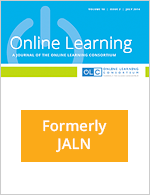An Exploration of the Relationship Between Indicators of the Community of Inquiry Framework and Retention in Online Programs
[Reprinted from 12:1, February 2008]
As the growth of online programs continues to rapidly accelerate, concern over retention is increasing. Models for understanding student persistence in the face-to-face environment are well established, however, the many of the variables in these constructs are not present in the online environment or they manifest in significantly different ways. With attrition rates significantly higher than in face-to-face programs, the development of models to explain online retention is considered imperative. This study moves in that direction by exploring the relationship between indicators of the Community of Inquiry Framework and student persistence. Analysis of over 28,000 student records and survey data demonstrates a significant amount of variance in re-enrollment can be accounted for by indicators of Social Presence.

